QuestionQUESTION: we are trying to go barefoot but we have a couple of concerns, We have just had his shoes removed as we had him x rayed and it showed he was very unbalanced in all four feet however you could not tell by just looking at them. So we have a barefoot guy trying to quietly re-balance him. we have had our first trim 3 weeks ago and he has said to start riding him on smooth hard surfaces, so far this is going great.One concern is that its winter and hoofs are soft, he has WLD, is pigeoned toed in, he is an older advanced competition horse and trying to keep him fit while transitioning is a huge challenge, we are finding little tiny bits of gravel embedding into his white line area, even though we are careful about not going off the tarsal, we are constantly removing them, i am really worried about him scuffing his toe area and wearing it down too fast.looks as if it has already. Normally he does 3 days on an arena and 4 days hacking...but at the moment we are just road riding. Our Barefoot guy travels up this way every few weeks and he is a great source of encouragement. I am running a rasp around the edges trying to keep it tidy. We are also dealing with a abscess, the original reason for the vet visit, x ray also showed up a gas pocket near the whiteline from most likely a nail track that had developed into WLD. when i look at the feet it looks like other areas have been compromised as well, I will add here that when he was shod he was on a very strict 4 week schedule. i just feel we are up against it, if we have to go back to shoes it is going to mean a 7 hour round trip to a master farrier which i am reluctant to do. So my questions are, is his feet too soft to allow us to proceed. Is there something that i can use to toughen,water proofing them with out having to find a stable for him to live in. What can we do to prevent his toes from wearing down.We do have boots which we feel are to small for him as we really have to jam his feet in and feel that his heels will suffer. And that dreaded WLD, after the next trim i am going to use a product called white lightening ( our Barefoot guy likes metalex )but where the pocket of gas is we have to wait until it grows out, as both the vet and Barefoot guy tried to reach it without much luck and thankfully a small notch which i am keeping plugged up, with cotton wool soaked in iodine and then putting a hoof putty over the top to keep it dry. The vet is also a 7 hour round trip away too, so its hard to keep focused and positive.
ANSWER: Good Morning -- sounds as if you're on the right track. If your horse is comfortable doing so, riding on the tar a bit every day will help condition his hooves the best. If you feel its wearing the hoof more quickly than it's growing back you might want to cut back on the time spent on the tar for right now while his hooves are 'healing'.
The equine hoof is an amazing thing and has amazing capabilities of healing itself given the right parameters and time. The White Lightening will help the WLD as will a balanced trim and conscientious care. I think a 4 week schedule right now with the trimmer would be apropos just like you had with your farrier. Once the hooves are 100% healthy again then you may feel comfortable backing off the trimming a bit if you see that he's maintaining his hooves well.
Ensuring a proper diet is paramount to healing hooves. They need all the O2 (from movement) and nutrients (from diet) they can get. I've found that adding fresh vegetables, fruits, nuts and seeds to the diet once a day produces fantastic hooves and health. Either add to the existing diet or complete substitution is also beneficial. Include 24/7 turnout for grazing and you're horse will have all that is necessary to heal his body. The issues you are dealing with not only arose from improper hoofcare but also from a weakened immune system. Please feel welcome to read my articles on Feeding the Natural Horse here: www.thepenzancehorse.com under "Articles". Also, at www.barefoottrim.com in the Educational section you'll find an article entitled "The Balanced Equine Hoof". Check both of those out -- I think both will be of value to you.
Again, I think you're on the right track. Keep up the good work! A little time will help heal, too.
:) --Gwen
---------- FOLLOW-UP ----------
QUESTION: Hi Gwen, with regards his management, we brought ( sounds awful ) started our relationship with him, a year ago, we had him blood tested which showed he was very low in sodium and magnesium, he also had suffered bad staggers from time to time, we have changed his diet so that he has almost a bale of hay a day, is out 24/7 and has a very small feed to sneak his additives in which are plain salt, a mineral mix, magnesium, omega 3,6,9 oil. He hasn't had staggers this year thankfully, i can add apples and carrots in his feed but what nuts and seeds do you recommend? Also he is worked everyday even if its just hand walking on his days off.
Company wise he has horses that he can see in the neighboring property and we visit him at least twice a day. Can you suggest any other ways to help his immune system ?
Thank you so much.
AnswerGood Morning - you'll find suggestions on the Feeding Horses Naturally page.
Almonds, pecans, brazil nuts, filberts, etc. NO black walnuts! Also, for sodium and minerals, both Celtic and Himalayan salt has both sodium and natural minerals (84 essential minerals) and they are not processed so hold all the true ingredients. You might want to look into those.
Omega 6 can be found in black oil sunflower seed and 3/9's are found in Flax seed. Flax is also a terrific anti-inflammatory.
Magnesium is found in many fruits and vegetables: Avocado, Banana, Blackberries, Raspberries, and Watermelon to name a few. Butternut squash, French Beans, Lima Beans, Okra, Peas, Spirulina
Swiss Chard are good vegetable sources for Mag. Nut sources are: Almonds, Amaranth, Cashews, Oats, Peanuts, Pinenuts, Pumpkin Seeds, Quinoa.
All above fruits, nuts and veggies are acceptable to feed to horses.
For the immune system you can look up some herbs to supplement. www.mountainroseherb.com has organic herbs so you know they're clean. Echinacea, Rose Hips, Astragulus are 3 that come immediately to mind for me. Just remember, herbs are medicine and while some are fine for humans, they may be irritating or even toxic to horses. The 3 that I mentioned are safe.
Good luck! Have an awesome day!

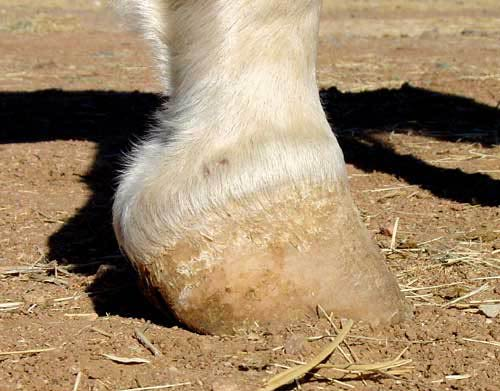 horse with high heels
Question
high heels
hello sir. if i buy a raceho
horse with high heels
Question
high heels
hello sir. if i buy a raceho
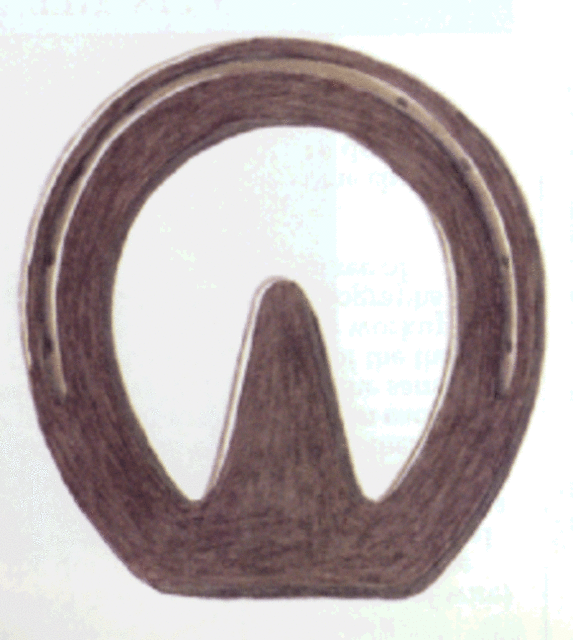 what shoe is this
Question
what shoe
hello sir, may i know the nam
what shoe is this
Question
what shoe
hello sir, may i know the nam
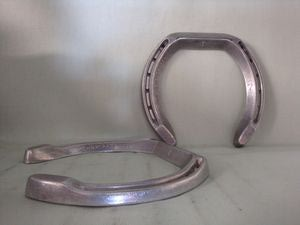 what type of shoe
Question
what type of shoe
hello sir, what type
what type of shoe
Question
what type of shoe
hello sir, what type
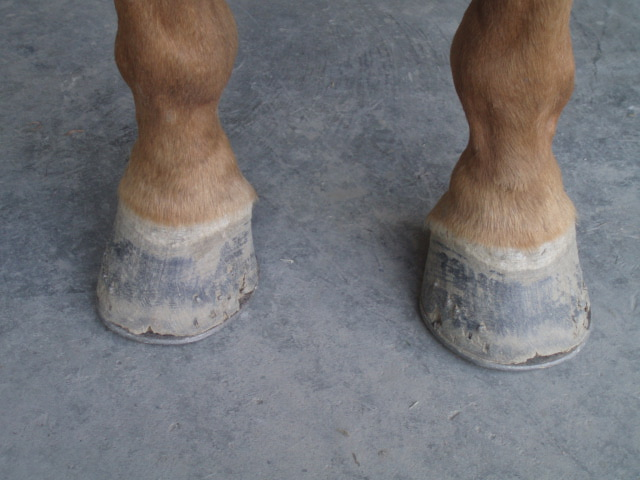 Is this white line?
Questionis this white line
is this white line &n
Is this white line?
Questionis this white line
is this white line &n
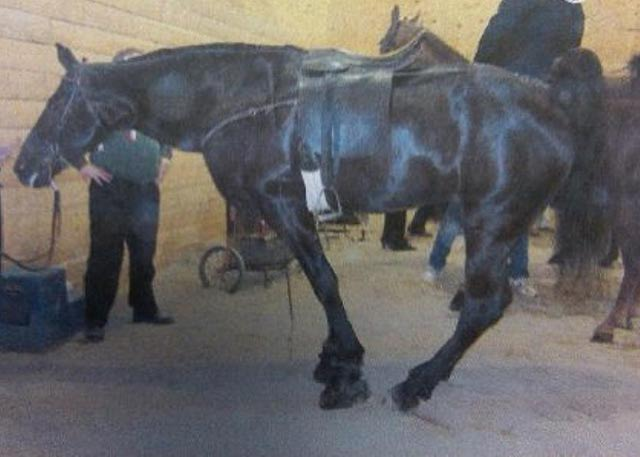 laminitis
Question
laminitis
hello sir, did this horse get
laminitis
Question
laminitis
hello sir, did this horse get